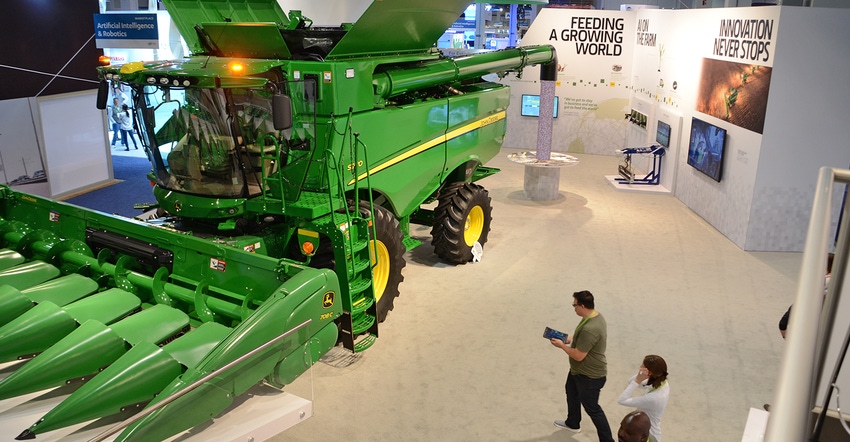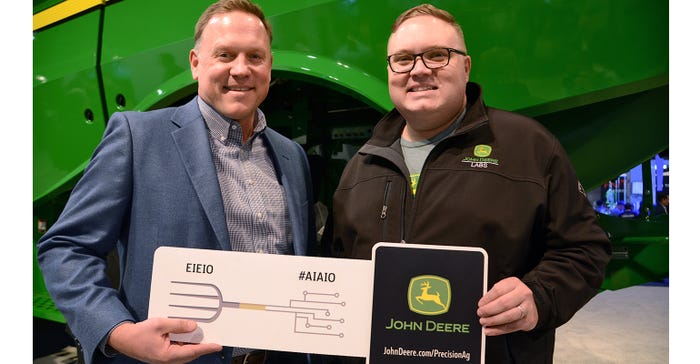January 28, 2019

There it sat, a massive green S770 John Deere combine at a trade show. It’s not the first time a farmer might see such a machine housed indoors and surrounded by bright lights and television screens. But this was no farm show: The combine — 20 tons of high-tech steel —sat square in the South Hall of the Las Vegas Convention Center during CES 2019.
Formerly known as the Consumer Electronics Show, CES has become a mecca for tech nerds and innovators to see the latest and greatest technology. For John Deere, it was an opportunity to show that there’s plenty of tech in farm country. But the company is also showing a new side of itself — as a tech collaborator.
A few weeks before CES, Deere announced the creation of its Startup Collaborator program in the Intelligent Solutions Group. Longtime observers of John Deere might be surprised to hear the word “collaboration” from company management, but this changing tech world is bringing new opportunities that can be leveraged by working with innovators.

COLLABORATORS: John Teeple (left) is director, John Deere advanced technology; and Alex Purdy is director, John Deere precision ag strategy and business development. They shared the company’s vision for working in the ag tech space going forward. The sign they hold was used during CES 2019 to add a little humor showing the link between tech and farming.

Farm Progress sat down with two key John Deere folks in the company’s tech space: John Teeple, director, advanced technology, and Alex Purdy, director, precision ag strategy and business development, during CES to explore the Startup Collaborator, and how the company is working in new ways in its role to help feed the world.
The pair bring interesting perspectives on the topic. Teeple is a 23-year veteran John Deere employee and has seen the rise of precision ag at the company. Purdy joined the team three years ago and is heading John Deere Labs in San Francisco.
“At its core, we know that technology is going to be increasingly important for a farmer’s operation, and a lot of that technology is being built in other locations that often aren’t connected to the customers the way that Deere is,” said Purdy. Many startups are in diverse locations on the West Coast, but they’re also in global locations.
Collaboration plan
With the Startup Collaborator, John Deere has created a program to potentially bridge that gap. Many startups may have a great idea, but connecting that idea to the farm can be significant. No idea can thrive beyond the lab if it doesn’t get market support from logistics to dealer service. It’s that expertise that John Deere offers.
And John Deere benefits, because, as Purdy said, “We can’t do everything on our own.” It’s about creating an open ecosystem, where technology can come and work with John Deere equipment for customers — which the company says is important.
Teeple and Purdy were clear that John Deere is not investing in companies with this program. Purdy explained that the name “collaborator” was carefully chosen because the company is not taking an equity position. But that approach also gives John Deere opportunity.
He noted that they could choose the best names among startups and that there was flexibility, because it isn’t a financial partnership. If money is involved, that can complicate the approach. John Deere wants to help drive innovation in the ag tech space instead of sitting on the sideline. Those same companies are working with venture capitalists or startup accelerators; if John Deere tried to enter the space that way, that might limit options.
“We were very careful about choosing the first companies,” Purdy said. “These companies are still faced with technical challenges in getting their products to work in real agriculture. The program allows us to help test technology in real applications to understand how it can fully meet customers’ needs.”
These technologies can be built to work with John Deere equipment in mind, or not work directly with John Deere; but working with them early they can enter the ecosystem, which can benefit customers. “It elevates what our ecosystem can do,” Purdy said, because the company will better understand its interface in the context of other tools.
“It’s an opportunity for us to be prospecting with some of these … very early-stage startups,” added Teeple. This kind of collaboration relationship can give the company access to new tools and offers the chance to learn about them. But he added that this relationship will go beyond linking dealers and customers to new tools.
“We’re also offering mentoring for [these companies], so a leader like myself is dedicating time over the course of the collaboration and relationship to do some coaching of these small teams,” Teeple added. “There’s a lot in it for them, and for us it’s really good.”
Teeple referenced John Deere’s purchase of the ag tech innovator Blue River, a company that was much farther down the development road that the collaboration subjects of this new project. Companies identified for the Startup Collaborator may get a subjective boost from the relationship. He noted that these firms are much earlier in their development, and John Deere is getting an early awareness of these companies and their products. “It’s clear that this is a collaborative, mentoring relationship,” he noted.
Starting with 3
John Deere has identified three companies to fire up the Startup Collaborator. Hello Tractor, Taranis and Bear Flag Robotics.
Hello Tractor is a Nigerian company that, Purdy explained, is about bringing mechanization to a new customer group “in an area of the world where Deere has a strategic interest, and customers are clamoring for access to technology.” The company is developing fleet-management tools for smallholder farmers in Africa.
Purdy explained that the company has some big technical challenges, and business model challenges to hurdle: “But we’re excited to be part of that and learn about that, and it’s also very exciting for us to leverage our global experience of our brand.”
Taranis is an Israel-based company that, Purdy said, has “some of the best computer vision and machine learning experts.” The company has a similar skill set to the vision and machine learning offered from Blue River; but he noted that Taranis is pointing that in a different direction “we find interesting and compelling around [crop] disease detection … maybe even preventative.”
This collaboration is more of a European-Middle East play that also can leverage the John Deere global scale. He added that the product has had some traction in North America, but not a lot of people have heard about the product at all. “We’re excited to get to know the team and get to know their capabilities a little bit more, and understand where those capabilities can be deployed,” Purdy said.
Bear Flag Robotics is based in Silicon Valley (California) and is pointed squarely at autonomous vehicles. “This is quite an interesting and compelling group,” Purdy said. It’s a small group that, he explained, has “some of the best pedigree of computer vision folks we’ve seen.”
They are focused on perception and control. Purdy explained that this is a group of technologists looking for a problem to solve; and they found the problem, but they have little knowledge of customers. “They can benefit from Deere by approaching it from a customer need back [to their technology],” Purdy noted.
Teeple added that Bear Flag tech is a retrofit to existing machines — it’s not a new machine. “There’s a lot for us to learn as an [original equipment manufacturer], and there’s a lot we can contribute as an OEM,” he noted. There are many issues surrounding the journey to autonomy, and working with Bear Flag is part of getting a better understanding of what that will take.
The Startup Collaborator is in interesting example of how one major manufacturer in agriculture is embracing change in new ways. Engaging these startups can give John Deere insight into opportunities from the future. What that will mean for the company and its customers remains to be seen. Stay tuned.
About the Author(s)
You May Also Like






